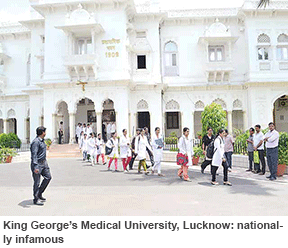AN INTERSTATE MEDICAL admissions scandal with Lucknow’s King George’s Medical University (KGMU) at its centre, is generating tremors in India’s most populous (200 million) — and arguably most lawless — state. While this is by no means the first scam in KGMU, it is of such massive proportions that the state’s Special Task Force (STF) has called for the Central Bureau of Investigation (CBI) to probe it.
 Last October an aspiring Noida-based medical student filed a complaint with the Lucknow police that he had been duped by two faculty members, an employee and student of KGMU, who had assured him of admission into this prestigious medical college in consideration of a sum of Rs.31 lakh. Since then the complaint has snowballed into a huge racket with more than 100 KGMU students under investigation for having been admitted into the college through fraud and bribery.
Last October an aspiring Noida-based medical student filed a complaint with the Lucknow police that he had been duped by two faculty members, an employee and student of KGMU, who had assured him of admission into this prestigious medical college in consideration of a sum of Rs.31 lakh. Since then the complaint has snowballed into a huge racket with more than 100 KGMU students under investigation for having been admitted into the college through fraud and bribery.
Preliminary investigations indicate that Dr. K.P. Singh — one of two accused faculty members of KGMU — had established networks in other states and had similarly duped students in Rajasthan, Bihar, and Jammu & Kashmir in addition to Uttar Pradesh. An alum of KGMU himself, Singh reportedly took 14 years to complete the university’s five-year MBBS programme. Yet KGMU authorities are at a loss to explain how despite being such a poor student, Singh landed a job as faculty member in the department of microbiology, indicating a mafia network within the university (estb.1911).
Singh’s modus operandi was to approach test prep and coaching schools preparing higher secondary school leavers for medical entrance exams (AIIMS, CET, COMED-K, etc) through a Noida-based consulting firm, and offer them assured seats for negotiated consideration to be paid in the office of Dr. D.K. Katiyar (the other faculty named in the first information report). How this is connected to the larger racket of cheating and impersonator examination writers of the medical entrance and term exams, are questions which the STF is investigating. One of the STF’s achievements is that it has linked nine impersonators from KGMU with the Madhya Pradesh pre-medical test conducted by the state’s Professional Examinations Board.
Certainly over the past 12 years since the King George’s Medical College was accorded university status by the state government, KGMU faculty, students and alumni have become nationally infamous for cheating — rather than teaching — expertise. In 2004, a scam of teachers being bribed and threatened to award pass marks to students was discovered; in 2006 four students writing the varsity’s entrance exam were found to be wearing specially tailored shirts fitted with earphones and mobiles through which answers were dictated from beyond the campus perimeter; in 2008, lookalike impersonators were discovered to be writing the entrance exam; and in 2012 an impersonator with a high definition micro camera which scanned the question paper and sent it to a coaching centre from where the answers were relayed to him, was outed. More recently in January 2013, three students managed to stump the biometrics identification system by wearing microfilm on their thumbs.
Prof. Ravi Kant, who took charge as vice chancellor in April last year, is determined to rectify this vintage medical varsity’s image as a racketeering hub. K.P. Singh and D.K. Katiyar have been suspended together with three students whose involvement has been ascertained by the STF. “We are determined to get to the bottom of this. It’s shameful how the reputation of this prestigious university has fallen so low,” says Ravi Kant.
Brave words. But there’s a deja vu ring to them.
Puja Awasthi (Lucknow)